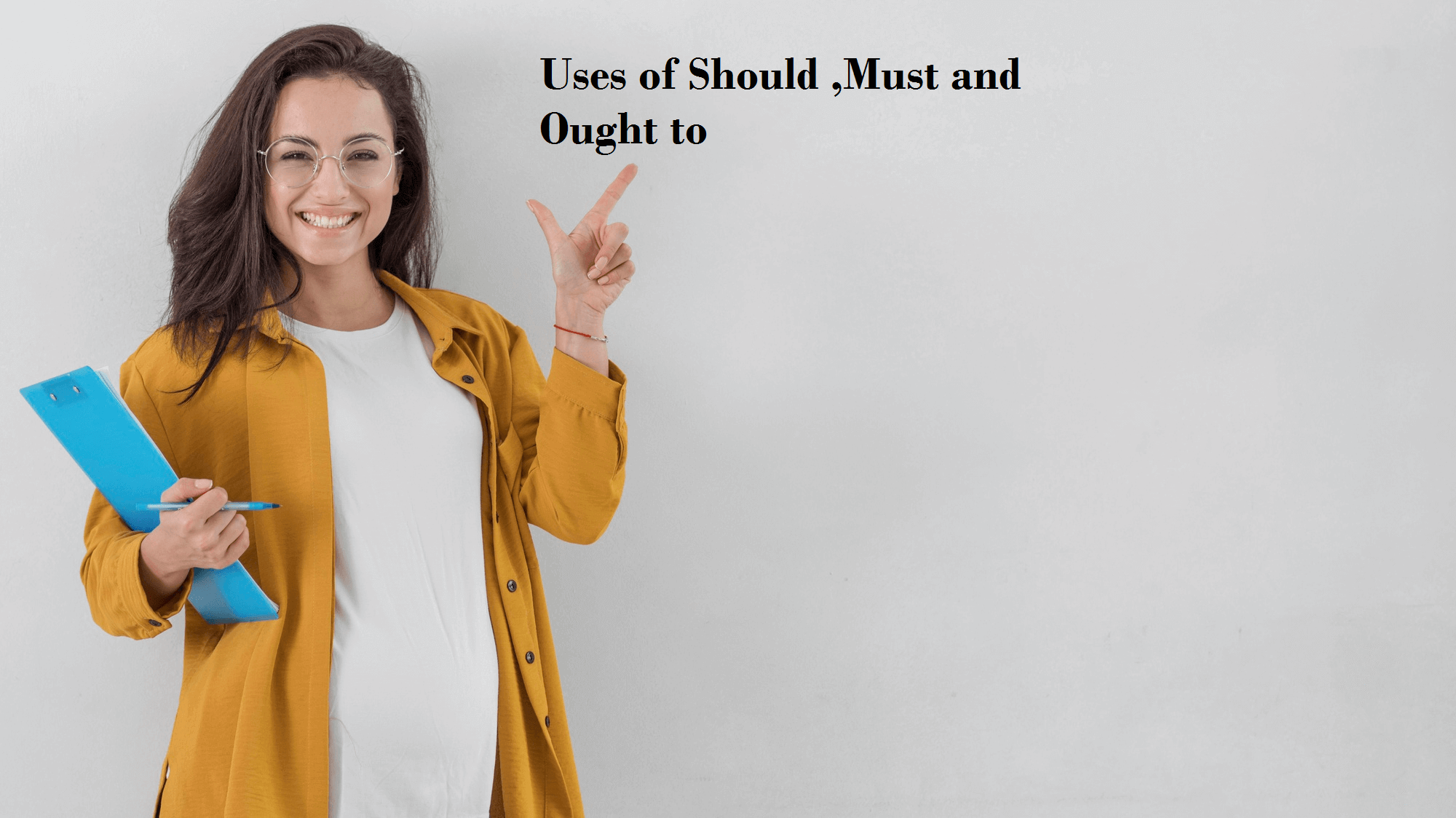Uses of Should ,Must and Ought to
“Should,”, “must,” and “ought to” are modal verbs. In English, these are used to express varying degrees of obligation, importance, and recommendation. Although they have similar meanings, their usage and force are a little different.
Should” is used to express suggestions, advice, and recommendations. It suggests that something is desirable or the preferred course of action, but it permits flexibility and choice. It implies a lesser degree of obligation than “must” or “should.”
“Must” imparts a strong sense of obligation, imperative, or requirement. It suggests that something is crucial or obligatory, leaving little or no space for choice or flexibility. It implies a greater level of compulsion than “should” or “ought to.”
The terms “ought to” and “should” are frequently interchangeable. It also conveys advice or recommendations, implying that a certain action is the appropriate or morally right However, sometimes “ought to” carries a stronger sense of obligation or duty than “should.”
The usage of these modal verbs can vary depending on the context and the speaker’s intent.
Use of Should
“Should “is the past form of shall. It is also used in sentences when giving suggestions. You can also use it in sentences when you want to say that something is ideally right to be done or happen.
The Past Form of Shall
Should is the past form of shall. Shall is the helping verb of the future tense. The rule to create the sentence with “should” is subject + should +verb1+object.For instance,
Direct Speech: She said to me,” You will do this.
Indirect Speech: She told me that I should do that.
In the above narration, direct speech is replaced with should to form indirect speech.
Suggestion
In sentences , someone is giving suggestions to others, “should’ is also used. The thing which is right officially, in those sentences, we can also use “should”. The structure of these sentences is subject +should + V1 + object.
For Example
- You should go.
- All students should maintain discipline in the class.
- You should buy a laptop.
- You should go to London for your higher studies.
- You should not gamble.
- You should understand the situation.
- You should bring food.
- how much of your credit should you use?
- how much of your credit card should you use?
- how many sprays of dior sauvage should I use?
- What sort of spacing should a cover letter use?
Ideally Right Things
If there are things that are ideally suitable to be done, those sentences are framed with “should”.
To illustrate :
- At least there should be two chairs.
- All citizens should be punctual.
- Everything should be ready by 7:30 a.m.
- We should be in the school at 8 a.m.
- Nobody should be late.
- You should be at least 18 years old if you want to go there.
- You should study for at least 3 hours a day to achieve the first rank.
Use of Must
“Must” is used in sentences in which suggestions are given or a probability of things happening is mentioned. And it is also replaced with “will certainly or will surely”. Let’s discuss all three uses of must one by one.
Advice or Suggestion
It is used for the work or task that is necessary to be done. In particular, “must” is used in sentences when the emphasis is on the action. So you need to understand that both “should” and “must” are used to give suggestions. But when “must” is used in the sentences, there is an emphasis on working. On the contrary, there is no emphasis on working in “should” sentences. The entire decision rests with the other person, whether to accept the advice or not.
The rule to frame these sentences is subject +must +V1 + object.
For example:
- You must speak. (In this sentence, there is an emphasis on speaking )
- We must reach the bus stand by six o’clock.
- We must call home after reaching there.
- If you want to go to Italy, then you must learn Tagalog.
Probability or certainty
When there is talk about the probability or certainty of things. Then “must” can also be used in those sentences. Therefore, when we estimate certain things, we use “must”. The sentence structure of these types of sentences is subject +must + be + object.
For example:
- This must be costly.
- This must be cheap.
- He must be at home.
- Don’t call him. He must be in college.
All the above sentences indicate there is an imagination of certain things.
Note that you frame the sentence with “may” and “might” like “He may be at home”, or “He might be at home”. In these sentences, there is less probability that he is at home. But the sentence “He must be at home” indicates that there is more probability that he is at home.
Replace with Will
The “must” is also used by replacing the future tense “will ” in some sentences.
Structure: Subject +must +V1 + object
For example:
- He must come.
- He must go there.
We can replace must with “will certainly ” or will surely. Have a look at the below sentences.
- She must come here.
- She will certainly come here.
- She will surely come here.
Use of “ought to”
“Ought to” is used in formal language and moral obligation sentences.
Used in formal language
Ought to originate from the Bible. It is used when you address people in the official language For example, if you are writing a letter to some high authority or you want to say it is necessary to be done, Then we can frame such sentences with “ought to”.
Structure: Subject +Ought to + V1 + Object
Look at the below examples :
- It ought to be done. (formal way )
- The poor ought to be helped by the government.
- You ought to help him.
Moral Obligations
All the good advice is based upon morality; with them, you can use “ought to”
Structure: Subject +Ought to + V1 + Object
- You ought to follow traffic rules.
- You ought to come here on time.
- We ought to serve our parents.
- We ought not to ignore the blind and handicapped.
- We ought to be extremely careful while on the road.
- We ought to do everything in favour of society.
- We ought to respect our elders.
- You ought to be there by now.
- This money ought to be enough for this work.
Also, you can use should in these types of sentences. But you should keep in mind that with “should,” you will never use “to”. like “should to” is not used in any type of sentence. But “ought to” is the right way to use it. Let’s consider one example frame with both of these models.
- You should speak English.
- You ought to speak English. (Formal way).
Read Also: Use of Can And Could
Read Also: Use of May and Might
Read Also: Top 10 Uses of Would







